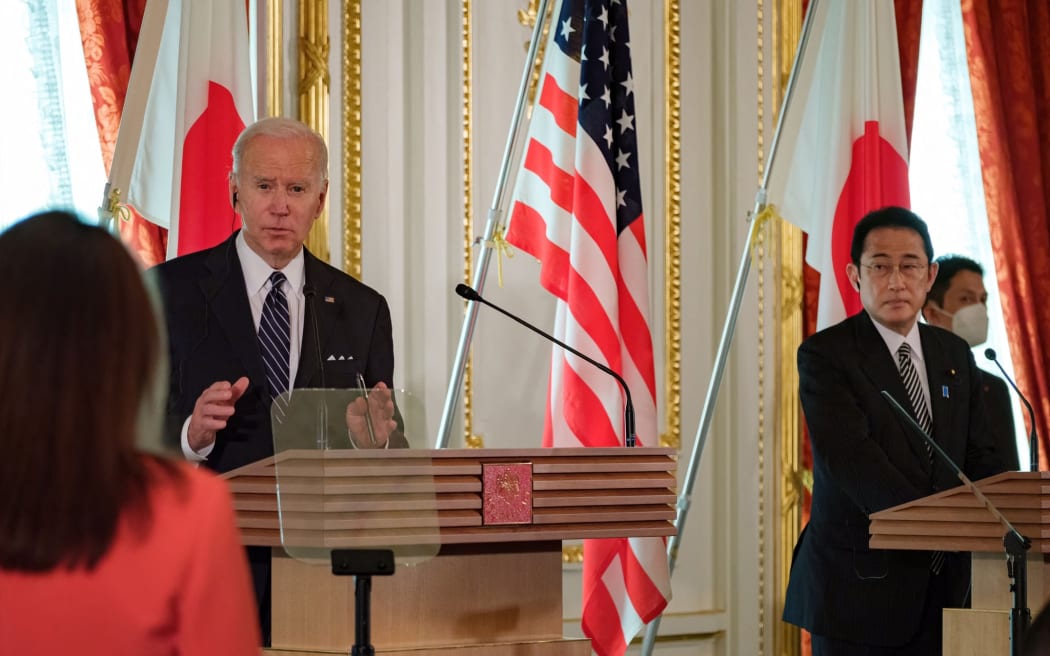President Joe Biden launched his plan for US economic engagement in Asia, leaving it to the 13 founding countries to work out how to enforce their agreements and if China could ever join.
Biden is unveiling the Indo-Pacific Economic Framework for Prosperity (IPEF) in Tokyo on his first trip in office to Asia.
The White House says the deal offers no tariff relief to the countries that join, including India, Malaysia and the Philippines, but provides a way to sort through key issues from climate change to supply chain resilience and digital trade.

Washington has lacked an economic pillar to its Indo-Pacific engagement since former President Donald Trump quit a multinational trans-Pacific trade agreement, leaving the field open to its key competitor China to expand its influence.
"The future of the 21st Century economy is going to largely be written in the Indo-Pacific - in our region," Biden said at a launch event in Tokyo. "We're writing the new rules."
Biden says he wants the deal to raise environmental, labour and other standards across Asia. The other initial founders are Australia, Brunei, Indonesia, Japan, South Korea, New Zealand, Singapore, Thailand, Vietnam and the United States.
But those founding countries will need to negotiate what standards they wish to abide by, how they will be enforced, whether their domestic legislatures will need to ratify them and how to consider potential future members, including China, officials told reporters.
"This will enhance access to sources of finance and technology," said Thai Prime Minister Prayuth Chan-ocha, who joined the launch event by video. "It is still a work in progress, with detailed consultations planned in the near future."
US Commerce Secretary Gina Raimondo told reporters that the IPEF presents Asian countries with "an alternative to China's approach to these critical issues".
China has expressed no interesting in joining IPEF. Many of the standards Washington wants would make such a deal unpalatable to Beijing, a US official claimed.
READ MORE
- China sends New Zealand letter asking to join CPTPP, has telephone chat with Damien O'Connor
- Grant Robertson denies New Zealand 'soft touch to China', believes CPTPP request not connected to AUKUS deal
- U.K. to Begin Process to Join Trans-Pacific Trade Partnership
- China applies to join Comprehensive and Progressive Trans-Pacific Partnership
Also left out of the initial talks is Taiwan, which wanted to join.
Biden's national security adviser, Jake Sullivan, told reporters on Air Force One that Taiwan would not be a part of the IPEF launch but that Washington is looking to deepen economic ties with the self-governing island, which China claims.
The IPEF is an attempt to salvage some part of the benefits of participation in a broader trade agreement like the one Trump quit, which is now known as the Comprehensive and Progressive Agreement for Trans-Pacific Partnership and was then known as TPP.
"TPP, as it was envisioned, ultimately was something that was quite fragile," US Trade Representative Katherine Tai said of the deal some feared would threaten U.S. jobs. "The biggest problem with it was that we did not have the support at home to get it through."
China applied in September to join the successor to TPP. When Japanese Prime Minister Fumio Kishida met with Biden privately today he said he told the US president that Washington should rejoin the trade deal.
Beijing appeared to take a sceptical view of the planned IPEF.
China welcomes initiatives conducive to strengthening regional cooperation but "opposes attempts to create division and confrontation," Foreign Minister Wang Yi said in a statement. "The Asia-Pacific should become a high ground for peaceful development, not a geopolitical gladiatorial arena."




